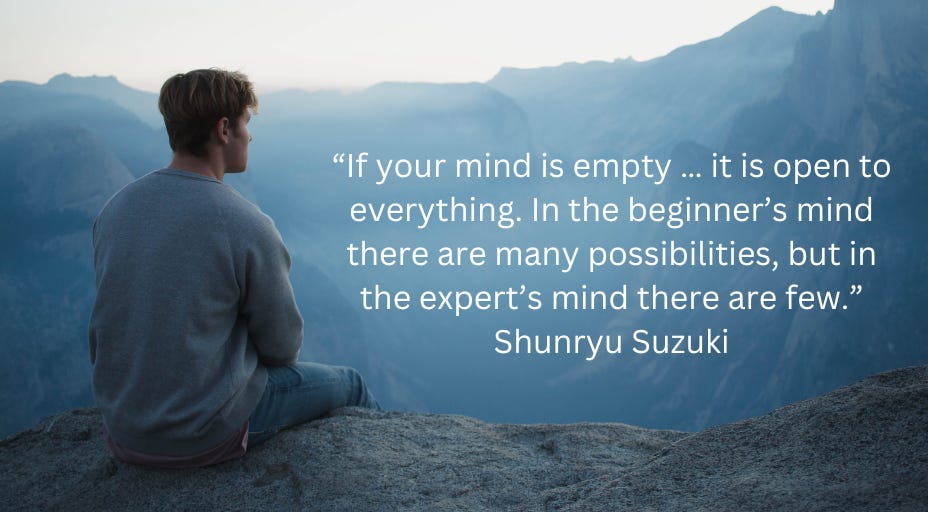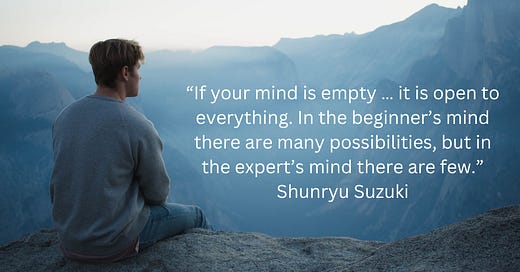With a Beginner's Mind

Living the Science of Mind (LSOM) is one of the first New Thought books I added to my library, referring to it many times over the years, it has been awhile since I have read it through cover to cover. Dusting off my copy, I want to examine each of the 141 essays by Ernest Holmes to support me in my use and further understanding of Science of Mind.
This year one of my personal projects is to reread this book and to do so with a “beginner’s mind.” To me, a beginner’s mind is to look at what is front of me as if I'm seeing it for the first time. Open with curiosity I approach it without a story, preconceived ideas, a history.
The late Shunryu Suzuki wrote,“If your mind is empty … it is open to everything. In the beginner’s mind there are many possibilities, but in the expert’s mind there are few.”
My intention is to look at each of the essays and attempt to read them with my mind open to the possibilities; and write about what new ideas and thoughts that they spark in me and to practice them.
My Method and Process
While I am writing daily, I want to respect subscribers email inboxes with a weekly digest rather than a daily email. Since I'm new to blogging platform and I'm just getting started, this will be a evolving process. This whole project will unfold organically.
Each week of 2023, I will read a set number of pages, using a Weekly Reading Schedule. You can download it here:
2023 Living the Science of Mind Reading Schedule
2023-Living-the-Science-of-Mind-Reading-Schedule.pdf
What is Science of Mind?
The book is called Living the Science of Mind and this weeks reading, “What is Science of Mind?” is an attempt to answer this question. Before we get to key ideas from the essay, what is it?
Science of Mind could be described as a spiritual and philosophical movement that was founded by Ernest Holmes in the 1920s. Its fundamental principle is Oneness, with the universe and all of its parts being spiritual in nature. When we align ourselves with spiritual principles, we “create” positive changes in ourselves and in the world around us.
Spiritual Practices
It is through spiritual practices, align with spiritual principles and reorient ourselves to our spiritual nature this can change our thinking and beliefs about our conditions resulting in a changed experience of life.
A primary practice in Science of Mind is spiritual mind treatment, a systematic form of affirmative prayer. Through treatment/affirmative prayer, we direct our words and thoughts to turn away from the story we have been telling about the condition and convince ourselves of the absolute Spiritual Truth. I use "treatment" and "prayer" interchangeably, so if you are not familiar with treatment - substitue the word, prayer.
When you change the way you look at things, the things you look at change. — Dr. Wayne Dyer
Treatment heals our minds of separation so we may see our world with the eyes of Spirit. Each time we treat we step into our identity as a child of God, and give ourselves the space to embody a new realization. We create a moment to experience a higher order of reality.
Key Ideas From “What is the Science of Mind?”
I need to work out how to reference quotes for readers since I read both on the Kindle and a physical copy of the book. This week with me just getting started I pulled some of the quotes that spoke more specifically to the question: "What is Science of Mind?"
"The Science of Mind is an outgrowth of the spiritual faith which people have had throughout the ages."
The Science of Mind is a spiritual approach to understanding the universe and our relationship to it, rooted in people's spiritual faith throughout history. It aims to bring together all findings in religion, philosophy and science related to man's relationship with the universe.
"The Science of Mind is built on the theory that there is One Infinite Mind which of necessity includes all that is, whether it be the intelligence in man, the life in the animal, or the invisible Presence which is God."
The One Infinite Mind includes intelligence in man, life in animals, and the Presence of God. Everything is in this One Mind.
"The Science of Mind is intensely practical because it teaches us how to use the Mind Principle for definite purposes, such as helping those who are sick, impoverished, or unhappy."
Science of Mind teaches individuals how to use the power of the mind for definite, specific purposes in a practical way which is more than mental, it is grounded in Spirit as First Cause. It is practical, when I become conscious of my pattern of thought I can redirect thought with purpose.
"It would be unwise to approach the Science of Mind with superstition. You must approach it with understanding."
Science of Mind does not require "blind faith," we may say know something but if we are unable to demonstrate it then we only know about it.
"You must come to realize that Mind exists as a Principle in the Universe, just as electricity exists as a principle."
The Science of "Mind" is theory of Mind, how It works, what It does; and how to use the principles of Mind to conditions. Knowing the principles of electricity we are able to utilize its power, knowing the principles of Mind we are empowered by It.
Science of Mind teaches individuals to transform themselves and the world, through the use of right ideas, right thought. One individual changinging their life, the entire world is changed. The tracjetory has been altered. The collected pond has new ripples.
Those were just a few of the quotes from this weeks essay that were answers to the question, "What is Science of Mind?" there were others - if you haven't the first essay take a few minutes to check it out.
This last quote was one that really spoke to me:
The misconception of the Spiritual Universe causes our universe to appear separated from good, and in fact we experience this separation. But that which is a fact in experience is not necessarily true in principle. Bondage cannot be conceived by the Divine, and yet we all know that bondage is a part of man's experience.
We experience suffering when believe that we are separate from our Good. It is our our misconception causes separation to appear and our experience of it. This does not mean that our suffering is not real. Of course it is a fact of our experience, but it is not the spiritual truth.
Albert Einstein called this "misconception", an optical delusion:
A human being is a part of the whole, called by us “Universe,” a part limited in time and space. He experiences himself, his thoughts and feelings as something separate from the rest—a kind of optical delusion of his consciousness. The striving to free oneself from this delusion is the one issue of true religion. Not to nourish it but to try to overcome it is the way to reach the attainable measure of peace of mind. - Albert Einstein
Science of Mind aims to guide us to freedom and peace in our minds and experience, awakening us to our spiritual magnificence. Its one issue is to overcome this "delusion" of separation and bring our thinking and actions into harmony with the Truth of the whole.



